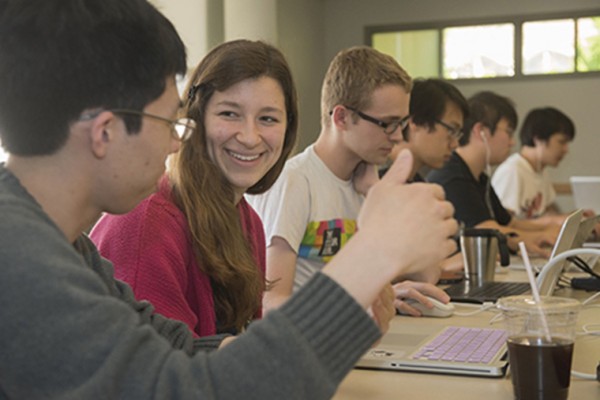Massively parallel biology students
The list of authors for an article on the comparative genomics of a fruit fly chromosome, published online May 11 by the journal G3, includes 940 undergraduates from 63 institutions. It is the result of an effort, coordinated through Washington University in St. Louis, to provide many more students with a hands-on research experience than has traditionally been possible.
A+ in outreach: Neuroscience students share enthusiasm about brain science
Some students enrolled in the
Cognitive, Computational and Systems Neuroscience (CCSN) pathway, are sharing their love of science and improving communication skills through community outreach. CCSN is a
specialization for graduate students in psychology, neuroscience and
biomedical engineering. The students are coaching low-income area teens for an international competition called the Brain Bee, and participating in many events, including the Nov. 10 Amazing Brain Carnival held at the St. Louis Science Center. The free event introduces the public to brain science research in St. Louis.
Using cognitive science to improve STEM teaching is conference focus, Sept. 27-28
Developing new and innovative approaches for the
teaching of science, technology, engineering and math (STEM) is the
primary goal of an interdisciplinary conference to be held Sept. 27-28
at the Charles F. Knight Executive Education & Conference Center at
Washington University in St. Louis.
HHMI awards WUSTL $1.6 million for science education
The Howard Hughes Medical Institute has awarded Washington University a 2010 Research University Grant to support the devleopment of creative, research-based courses and curricula. The university will receive $1.6 million over a period of four years/ HHMI also awarded Sarah C. R. Elgin, PhD, the Viktor Hamburger Professor of Arts and Sciences at Washington University in St. Louis, a long-time HHMI professor, $80,000 over four years to support her work on important problems facing science education.
Missouri high-school science achievement tied to quality teachers, study finds
While public officials aim to establish Missouri as an attractive destination for emerging life sciences companies, a study by researchers in the Department of Education in Arts & Sciences indicates that high-school science proficiency in the state, especially among high-minority and poverty populations, is greatly dependent on having a core group of certified teachers who are highly qualified to teach courses in their content area.
Missouri high school science achievement tied to quality teachers, study finds
While public officials aim to establish Missouri as an attractive place for emerging life sciences companies to start, a study by researchers at Washington University in St. Louis indicates that high school science proficiency in the state, especially among high-minority and poverty populations, is greatly dependent on having a core group of certified teachers who are highly qualified to teach courses in their content area.
Effective Partnerships Supporting Genetics and Genomics in the K-12 and Undergraduate Curriculum
The recent revolution in the life sciences- the sequencing of the human genome, and development of “high throughput” technologies- has created new opportunities for investigation, and created new challenges for educators. Sarah C.R. Elgin, Ph.D., professor of biology; biochemistry and molecular biophysics; and education in Arts & Sciences at Washington University in St. Louis, has been a proponent and creator of partnerships locally and nationwide to improve the life science education both in K-12 schools and at the undergraduate level.
Monsanto fund awards $3.7 million to Washington University for school science van program
The Monsanto Fund has awarded Washington University $3.7 million to develop, build and operate two custom mobile classrooms. Washington University will lead a partnership, including the St. Louis Science Center, the Missouri Botanical Garden, the Saint Louis Zoo, and the University of Missouri-St. Louis, to create and provide programming on the vehicles. The program will help young elementary school students develop enthusiasm for learning and doing science, through interactive experiences and exhibits.

